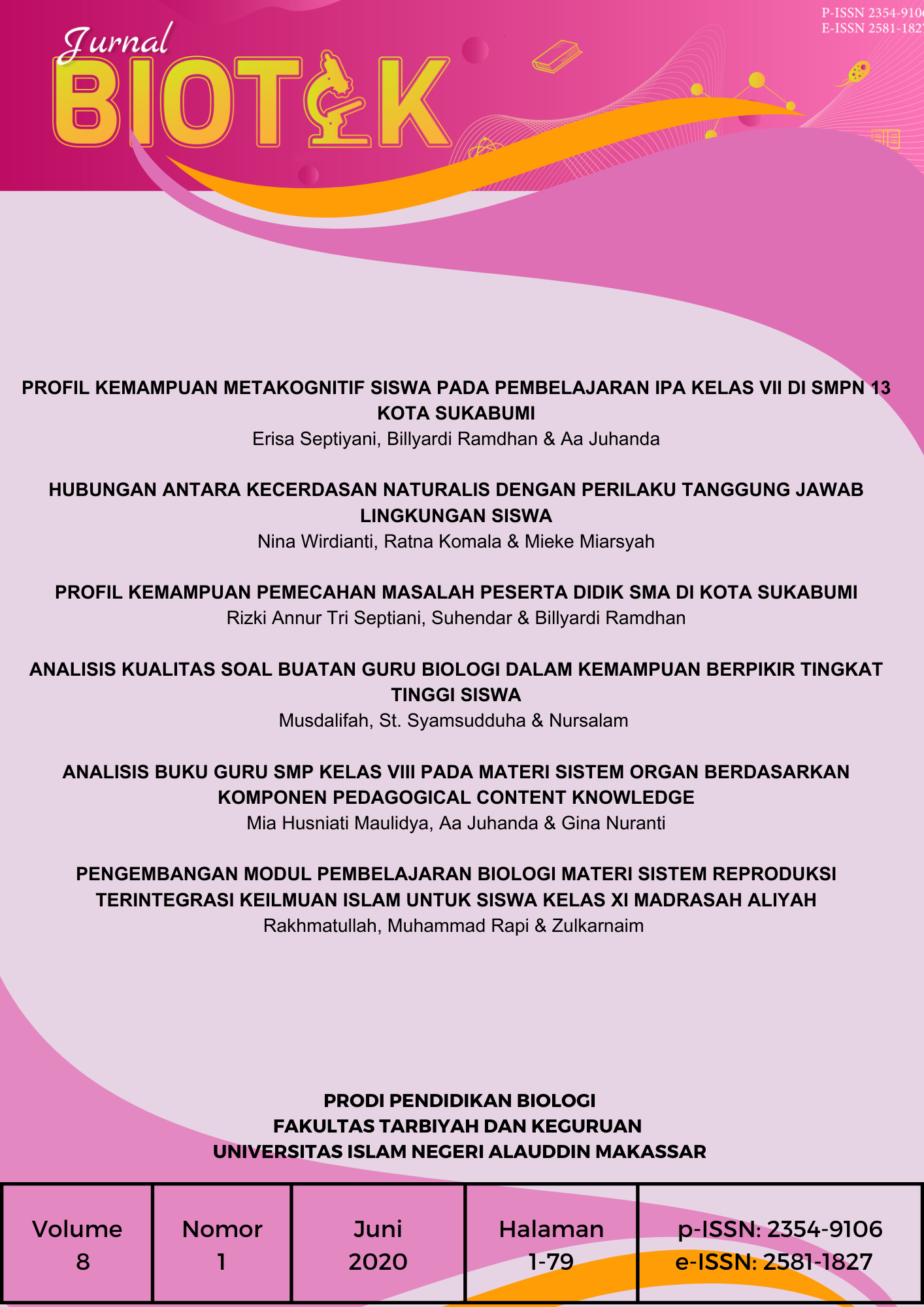PENGEMBANGAN MODUL PEMBELAJARAN BIOLOGI MATERI SISTEM REPRODUKSI TERINTEGRASI KEILMUAN ISLAM UNTUK SISWA KELAS XI MADRASAH ALIYAH
Abstract
The purpose of this study is to produce a valid, practical and effective module that can facilitate students to integrate the biological learning material with related verses in Al Quran. This was a development research (R&D) which referred to 4 D development model with four stages, namely; define, design, develop, and disseminate. The research instruments used were validation sheets, student response questionnaires and learning outcomes tests in the form of 20 multiple choice questions. The data analysis technique used was validity data analysis, practicality data analysis, and effective data analysis. Based on the results of the assessment of validator, the module was met with valid category with an average validity of 3.48. This indicates that the module can be applied in learning. Practical level of the module was in positive category with average practicality was 3.65. This indicates that the module can be used by the students easily. The effectiveness of the module was very effective with a percentage of completeness was 100%.
Downloads
References
Ananda, R., & adelila Sari, S. (2017). Pengembangan Media Chemopoly Game Struktur Atom untuk Meningkatkan Aktivitas dan Ketuntasan Belajar Siswa Kelas X di SMA Negeri 4 Banda Aceh. Jurnal Ilmiah Mahasiswa Pendidikan Kimia, 2(1). http://www.jim.unsyiah.ac.id/pendidikan-kimia/article/view/3405
Arikunto, Suharsimi. (2012) Dasar-dasar Evaluasi Pendidikan. Jakarta: Bumi Aksara.
Arimadona, S. (2017). Pengembangan Modul Pembelajaran Biologi Berbasis Integrasi Islam Sains. Jurnal Pendidikan Rokania, 1(2), 89-98. https://e-jurnal.stkiprokania.ac.id/ index.php/jpr/article/ view/71/36.
Asyafah, A. (2014). Research based instruction in the teaching of islamic education. SpringerPlus, 3(1), 755. https://doi.org/10.1186/2193-1801-3-755
Degeng, N.S. (2008). Pengembangan Model Pembelajaran. Surabaya: Teknologi Ilmu Pendidikan Program Pascasarjana Universitas PGRI Adibuana Surabaya.
Izzati, N. (2015). Pengembangan modul pembelajaran matematika bermuatan emotion quotient pada pokok bahasan himpunan. Eduma: Mathematics Education Learning and Teaching, 4(2). http://dx.doi.org/10.24235/eduma.v4i2.29
Hamalik, O. (2013). Proses Belajar Mengajar. Cet. XV, Jakarta: Bumi Aksara.
Hobri. (2010). Metodologi Penelitian Pengembangan (Aplikasi Pada penelitian Pendidikan Matematika). Jember: Pena Salsabila
Ihsan, Fuad. (2003). Dasar-dasar kependidikan. Jakarta: PT Rineka Cipta.
Mansour, N. (2010). Science teachers’ interpretations of Islamic culture related to science education versus the Islamic epistemology and ontology of science. Cultural studies of science education, 5(1), 127-140. https://doi.org/10.1007/s11422-009-9214-5
Mustami, M. K. (2017). Validitas, Kepraktisan, dan Efektivitas Perangkat Pembelajaran Biologi Integrasi Spiritual Islam Melalui Pendekatan Saintifik. Al-Qalam, 23(1), 70-77. http://dx.doi.org/10.31969/alq.v23i1.392
Nieveen, N., & Folmer, E. (2013). Formative evaluation in educational design research. Design Research, 153, 152-169. http://www.academia.edu/download/34147761/educational-design-research-part-a_1.pdf#page=154
Sri Susilogati Sumarti, K. U., & Diniy, H. H. (2014). Material Module Development of Colloid Orienting on Local-Advantage-Based Chemo-Entrepreneurship to Improve Students’ Soft Skill. International Journal of Humanities and Management Sciences (IJHMS), 2(1), 42-46. https://lib.unnes.ac.id/33225/
Suwarni, E. (2015). Pengembangan Buku Ajar Berbasis Lokal Materi Keanekaragaman Laba-Laba di Kota Metro Sebagai Sumber Belajar Alternatif Biologi Untuk Siswa SMA Kelas X. Bioedukasi, 6(2). http://dx.doi.org/10.24127/bioedukasi.v6i2.336
Widyoko, S. Eko Putro. 2014. Evaluasi Program Pembelajaran Panduan Praktis bagi Pendidik dan Calon Pendidik. Yogyakarta: Pustaka Pelajar.
Copyright (c) 2020 Rakhmatullah Rakhmatullah

This work is licensed under a Creative Commons Attribution-ShareAlike 4.0 International License.
Authors who publish with Jurnal Biotek agree to the following terms: Authors retain the copyright and grant Universitas Islam Negeri Alauddin Makassar right of first publication with the work simultaneously licensed under a Creative Commons Attribution License (CC BY-SA 4.0) that allows others to share (copy and redistribute the material in any medium or format) and adapt (remix, transform, and build upon the material) the work for any purpose, even commercially with an acknowledgement of the work's authorship and initial publication in Universitas Islam Negeri Alauddin Makassar. Authors are able to enter into separate, additional contractual arrangements for the non-exclusive distribution of the journal's published version of the work (e.g., post it to an institutional repository or publish it in a book), with an acknowledgement of its initial publication in Universitas Islam Negeri Alauddin Makassar. Authors are permitted and encouraged to post their work online (e.g., in institutional repositories or on their website) prior to and during the submission process, as it can lead to productive exchanges, as well as earlier and greater citation of published work (See The Effect of Open Access).

This work is licensed under a Creative Commons Attribution-ShareAlike 4.0 International License.



